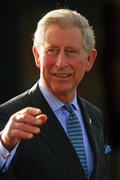 Jonathan Dimbleby’s essay in The Sunday Times about the kind of king Prince Charles would be suggests that the monarchy will be in for a turbulent time if and when Charles ascends to the throne. Dimbleby reports that Charles intends to move away from the strict silence on political issues of his mother and instead adopt a role more akin to that of the German or Irish president.
Jonathan Dimbleby’s essay in The Sunday Times about the kind of king Prince Charles would be suggests that the monarchy will be in for a turbulent time if and when Charles ascends to the throne. Dimbleby reports that Charles intends to move away from the strict silence on political issues of his mother and instead adopt a role more akin to that of the German or Irish president.
Obviously keen to avoid encouraging comparisons to To Play the King, Dimbleby stresses that Charles would avoid partisan issues. But the examples of topics where Charles might speak out that Dimbleby gives are intensely political, even if they are not particuarly party political at the moment:
“In a time of grave financial and economic turmoil, for example, Charles-as-king would be in a uniquely nonpartisan position to offer perspective and bring the nation together; to remind us that the British people have endured great troubles in the past but that they have invariably triumphed over adversity; that their genius is their strength and tolerance and their ability to work together for the common good; but that, perhaps, the international community should seize the unhappy opportunity of this crisis to reexamine the structure of the global market with a view to ensuring that it reemerges in a more sustainable form on a planet which, within a few decades, will have 9 billion mouths to feed.
Or, to take another example: in the run-up to a climate change summit, he might find a suitable platform – the Guildhall, the European parliament or the US Congress – to reflect on the threat posed by global warming and to urge all leaders to commit themselves to the policies and timetables required to avert the “catastrophe” he and others foresee.”
Placing the Monarchy into the middle of such political debates is intensely risky. Part of the reason the Monarchy is currently relatively uncontroversial is that the Queen has avoided this; The Sunday Times’s scoop about her opinion of Margaret Thatcher caused such a stir because people had so little idea about her politics.
A King who speaks out on political issues would endanger the delicate balance that allows a constitutional monarchy to exist in modern Britain. If and when he ascends to the throne, Charles would be well advised to be satisfied with the opportunity to offer his opinions and advice to the Prime Minister at their weekly meetings.







Comments